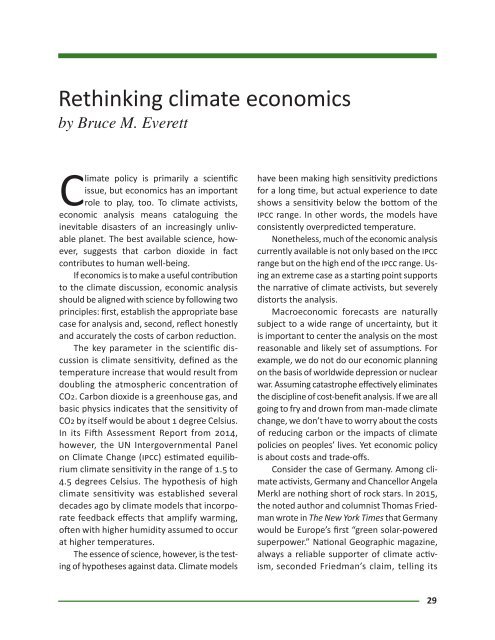The Climate Surprise
The-Climate-Surprise_CO2C-New-Criterion-1
The-Climate-Surprise_CO2C-New-Criterion-1
You also want an ePaper? Increase the reach of your titles
YUMPU automatically turns print PDFs into web optimized ePapers that Google loves.
Rethinking climate economics<br />
by Bruce M. Everett<br />
<strong>Climate</strong> policy is primarily a scienfic<br />
issue, but economics has an important<br />
role to play, too. To climate acvists,<br />
economic analysis means cataloguing the<br />
inevitable disasters of an increasingly unlivable<br />
planet. <strong>The</strong> best available science, however,<br />
suggests that carbon dioxide in fact<br />
contributes to human well-being.<br />
If economics is to make a useful contribuon<br />
to the climate discussion, economic analysis<br />
should be aligned with science by following two<br />
principles: first, establish the appropriate base<br />
case for analysis and, second, reflect honestly<br />
and accurately the costs of carbon reducon.<br />
<strong>The</strong> key parameter in the scienfic discussion<br />
is climate sensivity, defined as the<br />
temperature increase that would result from<br />
doubling the atmospheric concentraon of<br />
CO. Carbon dioxide is a greenhouse gas, and<br />
basic physics indicates that the sensivity of<br />
CO by itself would be about degree Celsius.<br />
In its Fih Assessment Report from ,<br />
however, the UN Intergovernmental Panel<br />
on <strong>Climate</strong> Change () esmated equilibrium<br />
climate sensivity in the range of . to<br />
. degrees Celsius. <strong>The</strong> hypothesis of high<br />
climate sensivity was established several<br />
decades ago by climate models that incorporate<br />
feedback effects that amplify warming,<br />
oen with higher humidity assumed to occur<br />
at higher temperatures.<br />
<strong>The</strong> essence of science, however, is the testing<br />
of hypotheses against data. <strong>Climate</strong> models<br />
have been making high sensivity predicons<br />
for a long me, but actual experience to date<br />
shows a sensivity below the boom of the<br />
range. In other words, the models have<br />
consistently overpredicted temperature.<br />
Nonetheless, much of the economic analysis<br />
currently available is not only based on the <br />
range but on the high end of the range. Using<br />
an extreme case as a starng point supports<br />
the narrave of climate acvists, but severely<br />
distorts the analysis.<br />
Macroeconomic forecasts are naturally<br />
subject to a wide range of uncertainty, but it<br />
is important to center the analysis on the most<br />
reasonable and likely set of assumpons. For<br />
example, we do not do our economic planning<br />
on the basis of worldwide depression or nuclear<br />
war. Assuming catastrophe effecvely eliminates<br />
the discipline of cost-benefit analysis. If we are all<br />
going to fry and drown from man-made climate<br />
change, we don’t have to worry about the costs<br />
of reducing carbon or the impacts of climate<br />
policies on peoples’ lives. Yet economic policy<br />
is about costs and trade-offs.<br />
Consider the case of Germany. Among climate<br />
acvists, Germany and Chancellor Angela<br />
Merkl are nothing short of rock stars. In ,<br />
the noted author and columnist Thomas Friedman<br />
wrote in <strong>The</strong> New York Times that Germany<br />
would be Europe’s first “green solar-powered<br />
superpower.” Naonal Geographic magazine,<br />
always a reliable supporter of climate acvism,<br />
seconded Friedman’s claim, telling its<br />
29


